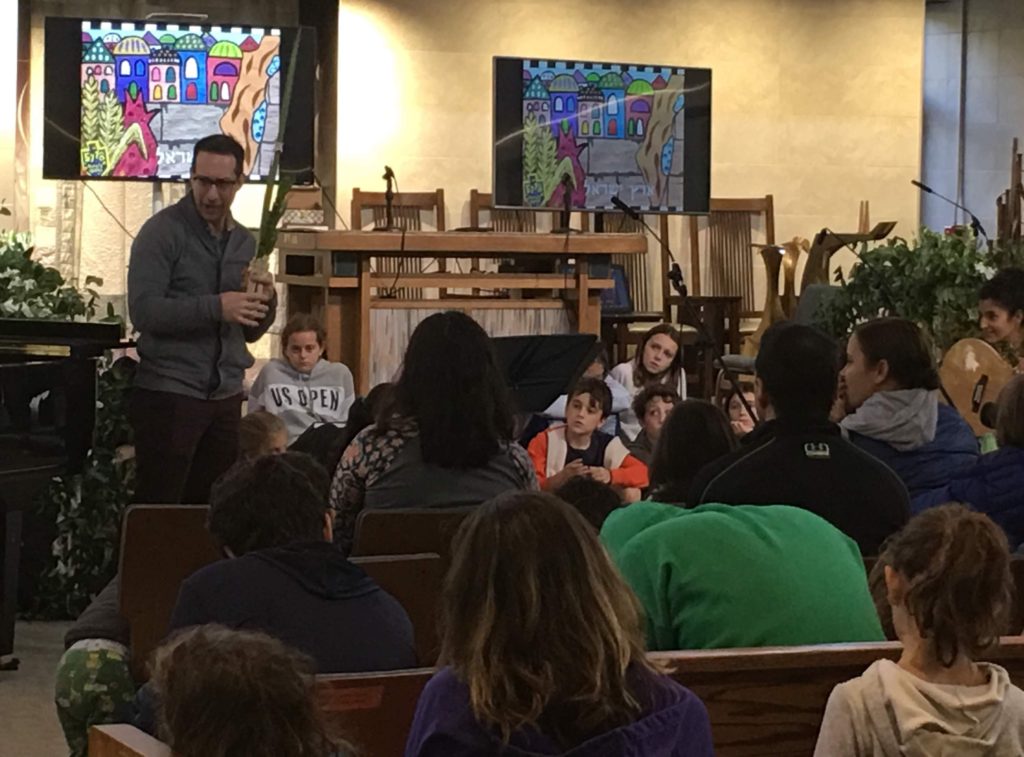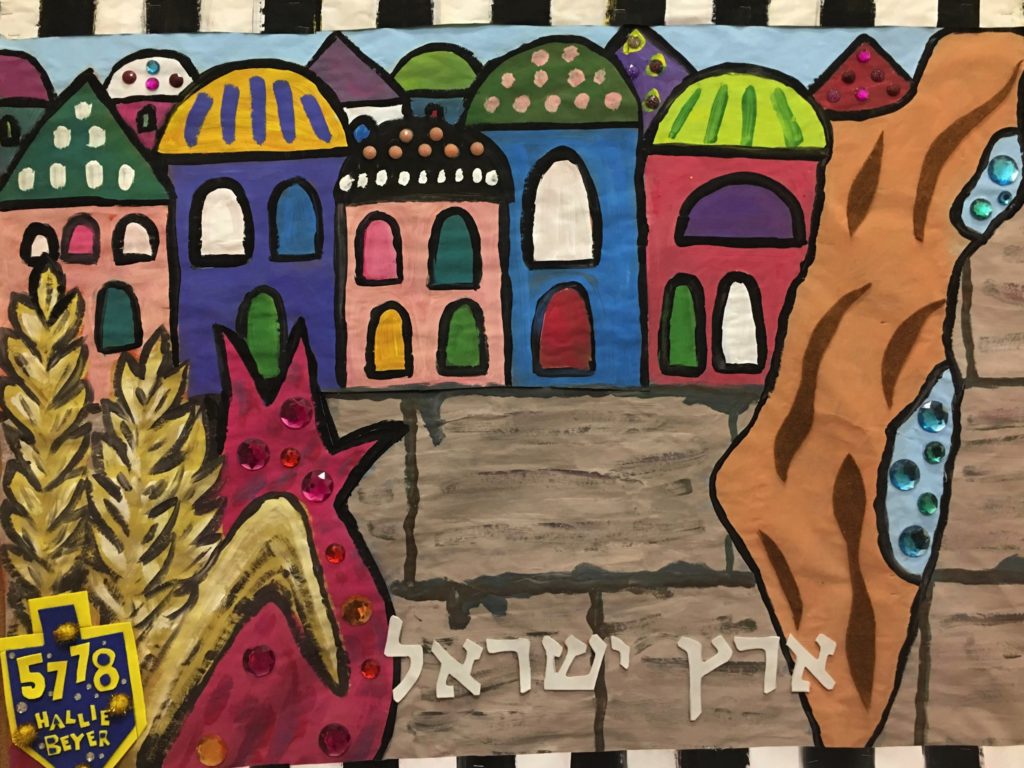Our Mission
At the Joel & Helen Jacobs Religious School of Temple B’nai Or,
we nurture the development of children into young adults
who love and celebrate being Jewish Americans.
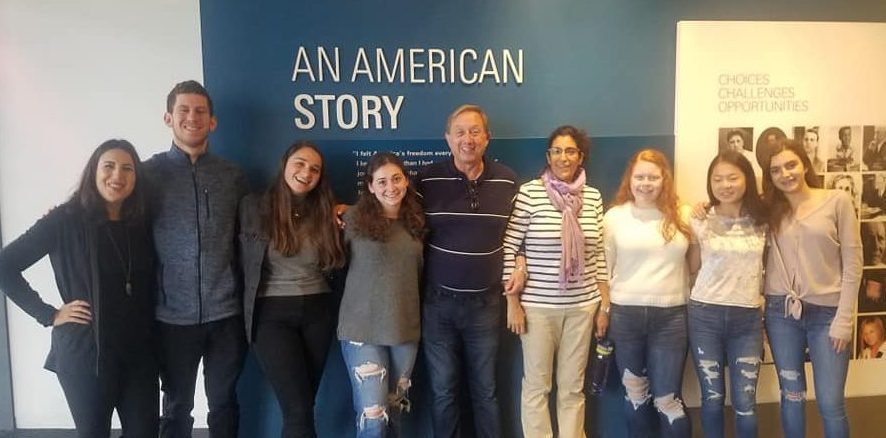
Dear Temple B’nai Or Parents,
This site is designed to provide you with the “big picture” of your child’s educational journey at Temple B’nai Or (TBO) from Kindergarten to their graduation from high school as Orim. For each grade, we share the highlights of your children’s learning of Torah, Israel, Culture and Values, their developing knowledge of Hebrew and T’filah (Prayer), and their, and your, shared experiences of Celebration and Community.
We are blessed to have very talented and dedicated teachers. Our teachers share moving words about their personal commitments to Jewish education and more importantly, their sincere concern for and great love of your children. I hope that you are as inspired by their words as much as I am.
L’Shalom,
David Iskovitz
David Iskovitz has been Director of Education at TBO since 1995.
“My entire life has been influenced by and dedicated to Jewish education. As a child of Holocaust survivors, a graduate of Jewish Day School, a teacher and administrator in NYC public schools, and Director of a Modern Orthodox Jewish summer program, I’ve melded the importance of education with the commitment to teach our children about God, our people, our history, and our land of Israel.
I genuinely love our students. My personal joy comes from watching them grow into confident and caring young adults who continue to learn and become the next generation of Jewish Americans in our long and proud history. For the teacher whose role it is to set the foundation of Judaism into the hearts of their students, I hopefully act as their supporting arm.
One has to believe in and love what one does every day. I am a most fortunate person that my life’s journey has allowed me to bring the soul and beauty of Jewish life to those beginning their own journeys with the Jewish people.”
Our Core Values
We learn and grow Jewishly, together. We develop, nurture, and strengthen Judaism and Jewish life for our children. Through learning about Jewish heritage, history, language and culture, we gain an understanding of Jewish peoplehood in our modern world. We blend facts, concepts, practices, and ideas from Torah, Talmud, Midrash, and prayer. We teach to the mind and the heart.
We create community and connections. Friendships among our students, teachers, madrichim (teen assistants), and families blossom and grow deeply over many years of shared Jewish experiences in the classroom, on trips and retreats, at Shabbaton, in the sanctuary and social hall, and at celebrations of holidays, milestones, and life-cycle events.
We foster acceptance and belongingness. All members of our community are embraced and cherished and our learning environment is warm, safe and secure. Our teachers, madrichim, and students work together to make each person feel welcomed and comfortable.
We delight in joy and fun. Our students and families experience Jewish life, rituals and learning as joyful, happy and fun helping students to form positive Jewish memories and proud Jewish identities.
We strive for openness and flexibility. Our leaders and teachers are open to new and creative ideas in Jewish education and committed to accommodating the individual needs of our students and families. We encourage open minds by worshiping with Jews of other denominations and visiting our neighbors of different faiths.
We invest in and love our students and families. Our leaders and teachers take responsibility for and invest in students’ growth as whole Jewish people from childhood to early adulthood.
Music Education
Music is magic! Throughout history, music has accompanied our people as teacher, from chanting of Torah and prayers, to joining as a community for Shabbat and holidays, to elevating us spiritually.
Music accompanies our children throughout their education at Temple. Through music, children learn the yearly cycle of the holidays, the Hebrew Alphabet, Jewish ethics, the stories of our people from the Torah, and the love of Israel.
For children who love music, our Ketzev Children’s Choir joyfully express themselves Jewishly through song and prayer. They rehearse weekly, lead our monthly Mishpacha Shabbat (family service), and participate in choir festivals.
Music is the vehicle that helps young teens become B’nai Mitzvah. They learn prayers during the weekly Sunday morning T’filah and have opportunities to lead prayer in every grade. Ultimately, they lead our congregation in a full Shacharit Shabbat service on their special day.
Following B’nai Mitzvah, teens who love music are encouraged to help lead the congregation musically. Our music madrichim (teen assistants) help lead Mishpacha T’filah (Family Prayer). During high school, engaging through music is encouraged. Honors of chanting Torah are offered during the High Holidays and other opportunities are tailored to the specific needs of busy teens.
Cantor Galit Dadoun-Cohen has been Cantor and a teacher at TBO since 2010. She is responsible for all aspects of musical expression in worship and education.
“I am inspired every time when I see a child of any age from preschool to high school experience a moment of revelation. I am humbled to be present in moments where one feels inspired or elevated through music or prayer.”
Janice Rozenwasser has been teaching music at TBO since 2014. She has worked as a music and Hebrew teacher for many years in the Jewish community and love sharing the joy of music with her students.
“I am so impressed by the warmth and depth of caring and commitment that I feel in TBO. My hope is that our music program enhances the love of learning and feeling of Jewish identity for our students.”
Personalized Hebrew Learning
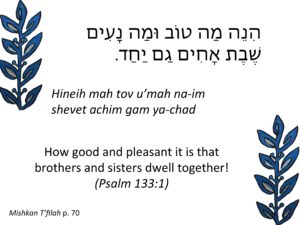
Familiarity and comfort with Hebrew is the first step for children to participate in and enjoy services, rituals and holidays. Our primary goal is for students to be able to enter any Jewish space – a synagogue, the Hillel center on a college campus, or a Jewish home – and by being comfortable with Hebrew, participate and feel a sense of belongingness.
Preparation for leading services as a Bar or Bat Mitzvah is another important motivation to learn Hebrew. Personalized instruction begins in 3rd grade and is designed to make learning Hebrew effective, efficient and fun. Students are tutored one-on-one over Skype or in small groups of one teacher and up to six students at Temple. This intimate learning deepens the relationship between student and teacher, provides the teacher with immediate awareness of the student’s progress, and gives the student immediate feelings of success and accomplishment.
Lisa Glyck has been teaching at TBO since 2006. Previously, she was the Educational Director of Congregation Beth Torah in Florham Park. Lisa began at TBO as a B’nai Mitzvah coach and, with David Iskovitz, initiated our successful Skype program for Hebrew learning.
“Seeing the progress our Skype students go from not knowing any Hebrew to being active members of our Jewish community is a heartwarming experience. I get tremendous satisfaction from seeing my students on the bimah the day of their Bar/Bat Mitzvah feeling confident, proud and well prepared. I also enjoy empowering our high school girls when I work with them on ‘Rosh Hodesh: It’s a Girl’s Thing’“.
Tina Levine has been teaching at TBO since 2013. She has 19 years of Jewish education experience teaching Grades 2 – 6, with a concentration in Hebrew Prayer and Torah/Haftarah. At TBO, she teaches 4th/5th grade Hebrew Prayer, tutors B’nai Mitzvah students and teaches Hebrew by Skype for all grade levels.
“My hope has always been to connect with my students, to make learning fun and relevant and to instill Jewish pride with the intent that these children mature into active members of their Jewish communities.”
Rachel Rothman has been teaching at TBO since 2012 and deeply involved in Jewish education for 25 years, teaching Jewish studies and Hebrew to a wide age range. Currently, she teaches 3rd to 7th graders at three religious schools, including TBO.
“I love teaching at TBO because of its camaraderie and community. The religious school is full of enthusiasm and energy. I appreciate witnessing the smiles, laughter and friendships between staff and students. I want children to feel supported and heard; to know that faith and learning is a process; to find meaning and personal connections in the beauty and joy of our rituals, traditions and language; and to see accomplishment and growth in themselves.”
Rivka Shacham See Mrs. Shacham’s bio under Grade 5.
Vered Weinglass See Mrs. Weinglass’ bio in Grade 3.
Mishpacha T’filah (Family Prayer)
Mishpacha T’filah (Family Prayer) is held every Sunday that religious school is open and is designed for students and their families, including parents, younger siblings and grandparents. Mishpacha T’filah provides families an opportunity, in addition to Shabbat, to pray together at Temple. The service includes many of the same prayers that students lead as Bar or Bat Mitzvah during Shabbat morning service, giving children and their parents many opportunities to become comfortable with the service. Lastly, the older children who may read from siddurim (prayer books) or who help lead the service, serve as near-peer role models to the younger children.
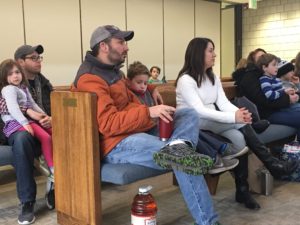
During Shachrit Mishpacha, we use “visual” t’filah (prayer), a method in which prayers and song lyrics in Hebrew, Hebrew transliteration, and English are displayed on a screen. Visual t’filah makes the service accessible to younger children, who are often beginning readers and whose little hands have difficulty holding a large siddur (prayer book).
With visual t’filah, children can clap, sway, and sing, which encourages a joyful prayer experience. It also helps parents to follow along! As the children learn more prayers, visual t’filah supplements what they already know. Beginning in 3rd grade, when students are bigger and better readers, they begin to read from siddurim.
Madrichim (Teen Teaching Assistants)
Madrichim are teenagers who assist our teachers. Madrichim are the heart beat of our school. They bring high energy and enthusiasm to everything they do. Most importantly, they serve as very visible and adored near-peer role models to the younger children.
Madrichim help in the classroom with activities and prayers and assist individual students who need extra help. Music madrichim assist Cantor during Mishpacha T’filah, playing instruments and leading songs, and they teach holiday songs and prayers to the children during their music class.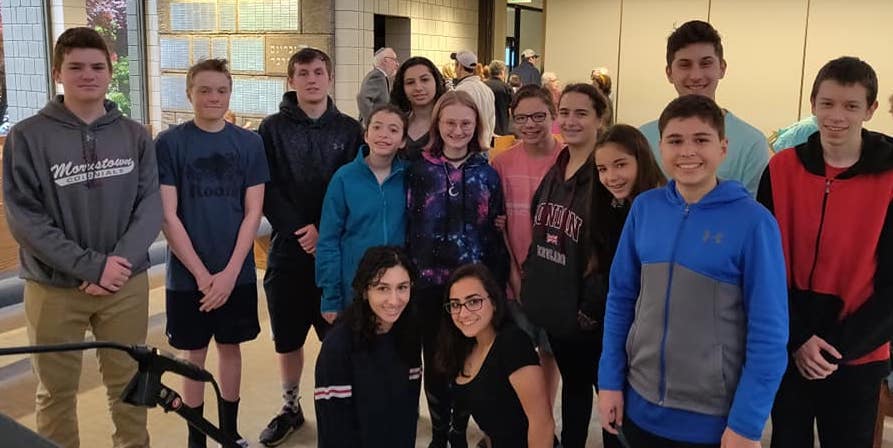 Madrichim meet with Mrs. Shacham once per month to talk about their role in our school and to learn together.
Madrichim meet with Mrs. Shacham once per month to talk about their role in our school and to learn together.
Madrichim build leadership skills and develop patience and empathy. Many of our former madrichim have become involved in Jewish education, community and leadership when they leave Temple. Students in grades 8-12 who are enrolled in religious school are eligible to become a madrich/a.
Rishonim (Israeli Teen Emissaries)
Rishonim are young Israeli emissaries who have not yet begun their military service who come to live in the U.S. for 9 months and volunteer in congregations. The goals of the rishonim program are to create personal connections between Jewish children in the U.S. and young Israelis, for young Americans to learn about life in Israel, and for the rishonim to learn about Jewish life and Judaism in the U.S. The TBO community’s rishon/rishonah supports the high school program (Grades 7-12) on Monday evenings and the K-6 program on Sunday mornings. They also attend class trips with Grades 7-12, our Mishpacha (family-focused) Shabbat services, and holiday services and social events. The rishonim are both near-peer teachers to our high schoolers and fellow students.
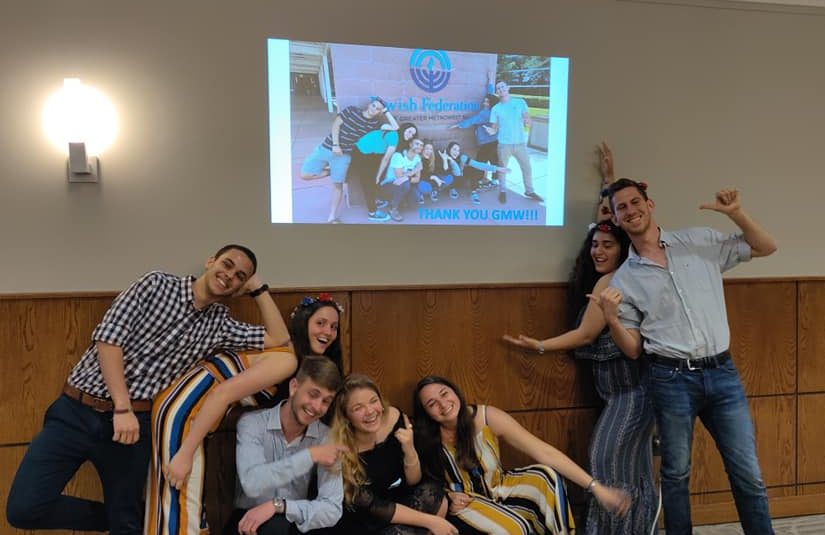
Serving Children with Special Needs
We strive to provide every family and child who desire to learn, grow, study and worship in our community with the support and resources necessary to fulfill those desires. All members of our community are embraced and cherished and our learning environment is warm, safe and secure. Our teachers, madrichim, and students work together to make each person feel welcomed and comfortable. Our leaders and teachers are committed to accommodating the individual needs of our students and families.
Bonnie Rosenthal has taught at TBO since 1999, working with children who have special needs. She currently provides in-classroom support, has been the teacher of the prior B’Tzelem classroom, taught children one-on-one, and has tutored Bar/Bat Mitzvah students. Nine of the children with special needs with whom she has worked have become Bar or Bat Mitzvah.
“I especially love working with children who have unique needs to achieve theirs and their families’ goals, which for many is to become Bar/Bat Mitzvah. Each child strives to overcome challenges in their Jewish learning, and I am there to assist in the process with various modalities that I can implement. A smile, a Judaica song belted out, the ability to follow along in the Siddur, a Hebrew letter or word sounded out, and more bring so much pleasure to my heart.”
Kindergarten
Susan Stark is a certified N-8 teacher with many years of experience with young children. Susan enjoys teaching through crafts and play.
Torah, Israel, Culture and Values. Students begin to learn Torah by experiencing the Genesis stories of Creation, Adam and Eve, Noah’s Ark, the Tower of Babel, Abraham the first Jewish person, Isaac and Rebecca, Jacob and Esau, and Joseph and his many-colored coat. The children also learn about key Jewish values such as tzedakah (charity, literally “justice”), tikkun olam (repair of the world), shalom bayit (peace in the home), visiting the sick, and caring for animals. A connection to Israel is fostered through learning about the country and its culture. All of these subjects are taught using a developmentally appropriate approach including storytelling, puppetry, and arts and crafts.
Hebrew and T’filah (Prayer). Students are exposed to spoken Hebrew and occasionally written words. As most Kindergarteners are just learning to read English, Hebrew is not taught formally. Prayer is introduced through family services, music, and by learning holiday blessings.
Celebration and Community. Students learn about Jewish holidays and ways they can celebrate them with their family and friends. Holidays are taught using a multi-sensory approach, including arts and crafts and cooking.
Grade 1
Danielle Heller joined TBO in 2018. She has a masters in education for K-6 and students with disabilities at Montclair State University. Ms. Heller has held several teaching positions.
“My hope for children in my classroom is for them to feel welcomed and comfortable. I want them to look forward to coming to Hebrew School and have fun each and every week.”
Torah, Israel, Culture and Values. Students begin to learn about early Genesis stories including creation, Adam and Eve, Cain and Abel, Noah, and Tower of Babel. Students also begin an initial study of Israel by taking a multi-sensory approach.
Hebrew and T’filah (Prayer). Students are introduced to the Alef-Bet with weekly letters and to the Hebrew language during Mishpacha T’filah (Family Prayer) and participation in family programs.
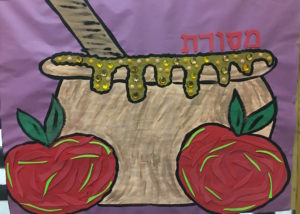 Celebration and Community. Students learn about Jewish holidays through hands on engagement. Various activities in class help spark their creativity. During Mishpacha Lomedet (family learning) days, we celebrate the current holiday with parents and siblings.
Celebration and Community. Students learn about Jewish holidays through hands on engagement. Various activities in class help spark their creativity. During Mishpacha Lomedet (family learning) days, we celebrate the current holiday with parents and siblings.
Grade 2
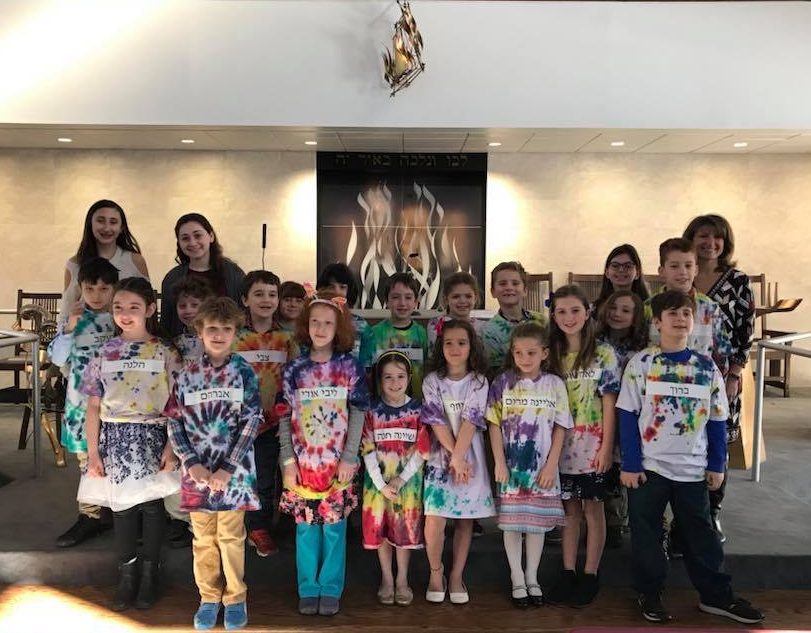
Jessica Temlock-Fields has taught at TBO since 2013. Mrs. Temlock-Fields has taught elementary and middle school and is currently teaching Music Together at Temple Sinai in Summit.
“Working with the 2nd graders at TBO allows me to help children develop an early love of Jewish learning and to take pride in their Jewish roots. The journey that they take during the year reminds me of why it’s so important to give back to the Jewish community.”
Torah, Israel, Culture and Values. Students continue learning the Genesis story focusing on our biblical ancestors Abraham, Sarah, Isaac, Rebecca, Jacob, Leah, Rachel, and Joseph. They also learn how Torah is written and organized. The importance of living Jewish values is explored through mitzvot (God’s commandments as to how we are to live) with a highlight on tzedakah (charity).
Over the course of the school year, students learn from their parents the origins of their Hebrew names and for parents with Hebrew names, their origins as well. These family stories help the children experience first hand the connection to their ancestors and to other people important to their families.
Hebrew and T’filah (Prayer). Students learn to identify and write Hebrew letters and sounds, particularly the first letters of their Hebrew names. They are also exposed to Hebrew by participating in Mishpacha T’filah (Family Prayer) and in the classroom. The students learn:
- the Sh’ma and Baruch Shem – the “watchword” of our faith that declares our belief in one God is the centerpiece of morning and evening services
- the Bar’chu – marks the beginning of communal worship
- Shabbat blessings over candles, wine, and motzi (bread)
Celebration and Community. The Hebrew name project culminates in February when the children stand on the bimah in the sanctuary and speak to their families about their Hebrew names.
Grade 3
Vered Weinglass has taught 3rd grade for more than 20 years and has been a teacher at TBO since 2015.
“I especially love teaching third grade. I am constantly thinking of new and exciting ways to teach Hebrew and making sure that learning Hebrew is fun! I enjoy watching my students become readers and exposing them to new vocabulary.”
Laurie Hoffman has taught at TBO since 2000. She is a certified early childhood education head teacher and director. She has been involved in several different forms of education including summer camp, supplementary and early childhood.
“I love teaching at TBO because of the strong feeling of family and community. It has been a tremendous privilege to see the adults that my past students have become. It is my hope that your children feel comfortable and enjoy learning in my classroom and, with open communication, that Jewish learning continues at home.”
Torah, Israel, Culture and Values. Students learn Bible stories from Abraham to the Exodus from Egypt. The children compare these stories to their life and are given the opportunity to explore their own interpretations of the text. We want the children to apply their insights to some of the problems and ideas contained in the Torah. Students learn about holidays from My Jewish Year. The children learn the tradition, customs, symbols and history of each holiday through stories, songs, games, and arts and crafts.
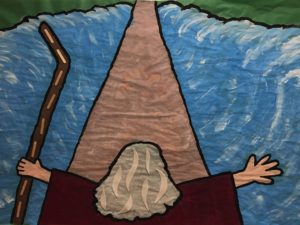 Hebrew and T’filah (Prayer). Students begin personalized Hebrew instruction and are introduced to Hebrew reading. They learn to recognize all the letters and vowels of the Alef-Bet and read and comprehend basic words. Students experience modern Hebrew through Hebrew through Movement and games and recognize phrases like “sit”, “stand”, “walk slowly”, “jump” while counting, and many more. By Pesach (Passover), students are able to read from the Haggadah the Four Questions, the beginning of Avadim Hayinu (the Pesach prayer that begins “we were slaves in Egypt…”), and the ten plagues. The students also learn the following blessings and prayers.
Hebrew and T’filah (Prayer). Students begin personalized Hebrew instruction and are introduced to Hebrew reading. They learn to recognize all the letters and vowels of the Alef-Bet and read and comprehend basic words. Students experience modern Hebrew through Hebrew through Movement and games and recognize phrases like “sit”, “stand”, “walk slowly”, “jump” while counting, and many more. By Pesach (Passover), students are able to read from the Haggadah the Four Questions, the beginning of Avadim Hayinu (the Pesach prayer that begins “we were slaves in Egypt…”), and the ten plagues. The students also learn the following blessings and prayers.
- Shechiyanu – a blessing of praise that is recited the first time you do something each Jewish calendar year (e.g., the first night of Hanukkah when you light the menorah) and to mark joyous occasions
- Hallelujah (Psalm 150) – a beloved prayer that enumerates many ways one can praise God
- Hineh Ma Tov (Psalm 133:1) – asks us to bring mindfulness and attention into the experience of being a community
- Mi Chamocha – the prayer in which we praise God for parting the Red Sea and taking us to freedom
- V’shamru (Exodus 31:16-17) – reminds us that we keep the Sabbath as a sign of the covenant with God
- Oseh Shalom – a prayer asking for peace, often sung at the conclusion of the Amidah
Several of these prayers and blessings occur in Mishpacha T’filah (Family Prayer), which helps children learn to recognize them during services.
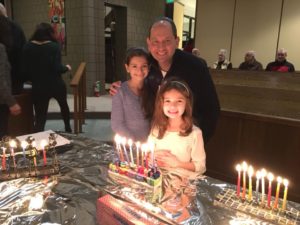
Celebration and Community. Students and their families (parents, siblings, grandparents et al) celebrate together during Hanukkah with Shabbat dinner followed by Shabbat services where they sing Hanukkah songs on the bimah. The Sunday before Passover, students prepare for their family’s seder by reading and singing from the Haggadah, eating Kosher for Passover food, and making crafts.
Grade 4
Rachel Fried has been teaching Hebrew and Judaic studies for almost 10 years in Jewish Day Schools as well as religious schools, and has taught 4th grade at TBO since 2013.
“My intention is to provide my students with a solid Jewish education, a warm community, and a strong Jewish identity. I want my students to love learning and have a good time doing it. My expectation for them is to learn something new every time they walk into my classroom, and my goal is to teach them in an engaging, enjoyable way.”
Torah, Israel, Culture and Values. Students continue to explore the bountiful riches of Genesis and Exodus stories that they began to explore in third grade. This year, we examine how the stories still impact us in the 21st century. The history is enough to fill up a whole year plus more. Students begin the process of connecting Jewish history and their lives today. How is it important? Why should we study? Students examine these issues and more through discussions, journals, acting, debates, arts and crafts, and much more! Questions are investigated with the understanding that the teacher does not have all the answers. Instead, the students are called upon to assist and bring their own knowledge to inquiry.
Students also explore Jewish holidays and values that are important to them and humanity overall. They learn that Jews are partners with God and that each person is created b’tzelem Elohim (in the image of God). Developing empathy, caring for the “other” or stranger, and remembering that all of us were once strangers in a strange land are key learnings.
Hebrew and T’filah (Prayer). The students learn these blessings and prayers:
- Yotzer Or – the first of two blessings recited before the Sh’ma during Shacharit (morning services) and praises that God’s work of creation is renewed daily
- Kiddush for Shabbat – acknowledges two of God’s greatest gifts, the Creation of the world and the Exodus from Egypt, and expresses gratitude for Shabbat The Kiddush is composed of two blessings: the first blesses the wine and the second distinguishes and sanctifies the day.
- Eilu D’varim – a list of ten mitzvot (literally, “commandments” or colloquially, “good deeds”) that focuses on the ways that each of us can improve the world, primarily by the concern we show for our fellow human beings
- Sim Shalom – a prayer asking for peace, often sung at the conclusion of the Amidah
- Yismechu (Exodus 31:16-17) – reminds us that we keep the Sabbath as a sign of the covenant with God
- Hatikvah – the national anthem of Israel
- L’dor Vador – literally “from generation to generation”, reminds us to declare God’s greatness across all generations, for eternity
- Chatzi Kaddish – a version of the Kaddish praising God that serves to delineate different sections of the service
Grades 4 – 6 practice many of these prayers when they worship together from the Mishkan T’filah siddurim (prayer books) on Sundays 11:00am – 11:45am.
Celebration and Community. A community is created where all beliefs and ideas are respected and all individuals cherished for the beautiful diversity that each contributes to our community. At the end of the school year, students receive their own copy of the Mishkan T’filah siddur, which begins their personal journey to become become Bar or Bat Mitzvah and they lead Shabbat evening services from their own prayer books.
Grade 5
Rivka Shacham has taught at TBO for over 30 years.
“Teaching in Hebrew School is a big Mitzvah, a great commitment, and it’s my mission. My goal throughout these years is to build a strong Jewish identity in our students. I teach in ways that they can acquire knowledge and become familiar with our Jewish heritage.”
Torah, Israel, Culture and Values. Israel, the Jewish state, is the magnet that draws Jews together from around the world. In 5th grade, students get to know the old and modern Israel, its geography and history, its multi-cultured society, its economic achievements, and much more. The students also take an in-depth journey to learn the entire Passover story from Joseph to Mount Sinai.
In our study of Israel, we use the book Experience Modern Israel and an innovative weekly newsletter Under cover Israel 21c. We are accompanied by two Rishonim, young Israeli emissaries who have not yet begun their military service who come to live in the U.S. for 9 months and volunteer in congregations. Through friendship and learning with our Rishonim, 5th-grade students are able to develop a strong connection to Israel. They are our future!
Hebrew and T’filah (Prayer).
We include 20-25 minutes of Hebrew reading during Sunday class. The students are expected to read the assigned prayers, correctly and almost fluently. At the beginning of the school year, we spend time to strengthen their familiarity with the letters, vowels and sounds. EVERYONE CAN READ HEBREW!
Students learn to read the prayers for Shabbat morning services with a focus on fluency. The Amidah (literally, “standing”) is the core of every service and refers to a series of blessings recited while standing. Every Amidah is divided into three central sections of praise, petitions and thanks. Students learn several parts of the Amidah as well as the following:
- V’ahavta – from Deuteronomy and Numbers, expresses how we will love God
- Adonai S’fatai (from Psalm 51:15) – the first line of the Shabbat morning Amidah asking God to open our mouths in praise
- Avot v’imahot – the first section of the Amidah, referencing our ancestors beginning with Abraham and Sarah
- G’vurot – the second section of the Amidah, acknowledging God’s power
- Eilu D’varim – an excerpt from the Mishnah that reminds us “these are the things”, or obligations, of what it means to lead a Jewish life
- Shalom Alechem (Peace to You) – a poem of welcoming Shabbat
- Aleinu – is a prayer used in every service expressing hope for God’s universal rule
- K’dushah – the central blessing of the Amidah recited in call-and-response with the cantor. Students learn the congregational responses
Grades 4 – 6 practice many of these prayers when they worship together from the Mishkan T’filah siddurim (prayer books) on Sundays 11:00am – 11:45am.
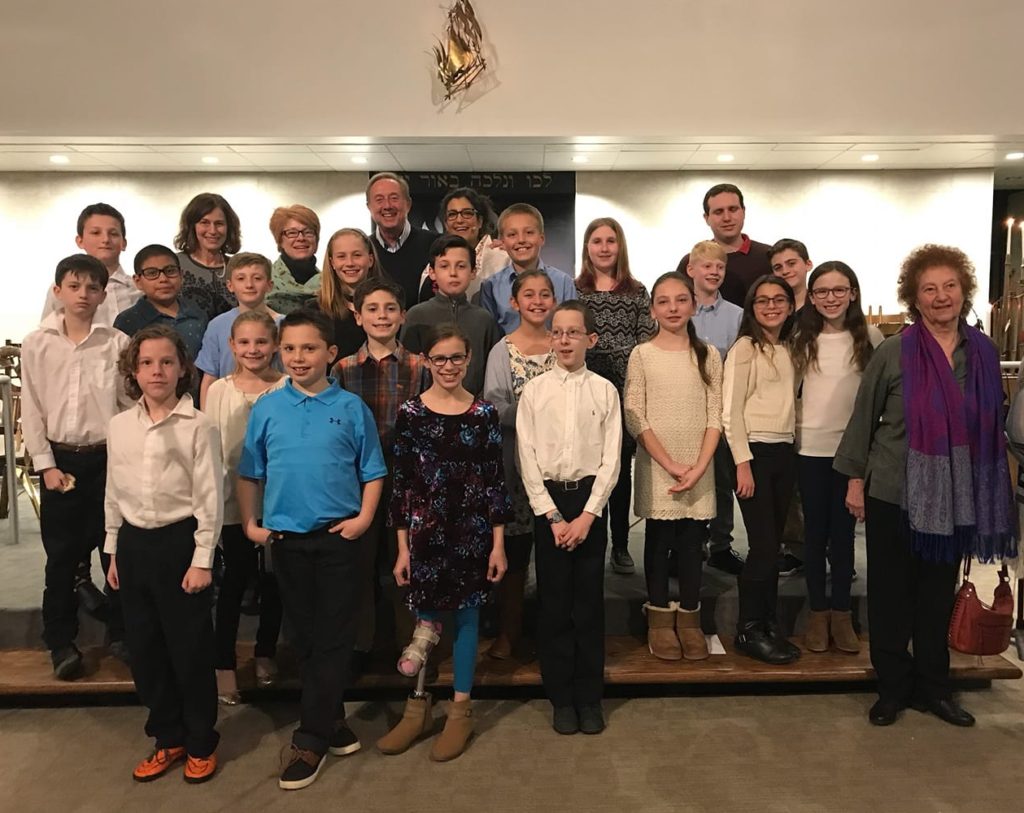
Celebration and Community. Students share the meanings and their understanding of the above prayers during the Grade 5 Shabbat service. Just before Passover, children and their parents have a fast-paced and exciting scavenger hunt that highlights their biblical learning.
Grade 6
Dr. Ray Zirkel has been teaching at TBO since 2000. In his 37-year career in education, “Dr. Z” has worked as a teaching assistant to special needs students with significant emotional difficulties. For 28 years, Dr. Z enjoyed a career as a school psychologist, helping general and special education students find success in school.
“There are many reasons why I love teaching at Temple B’nai Or. Over the years, the TBO community has become part of my family and I am a part of theirs. As I was growing up, my religious school experience was not very positive. As a teacher at TBO, I want to share positive Jewish experiences with my students and make sure my students have a fun and meaningful learning experience. My hope is that each student develops a lasting love for Judaism and a feeling of Jewish pride and identity that remains with them into adulthood and through their own life-cycle events.”
Rivka Shacham See Mrs. Shacham’s bio under Grade 5. Mrs. Shacham teaches Hebrew to 6th graders on Thursdays.
Torah, Israel, Culture and Values. The 6th grade focuses on the understanding of Mitzvah and Jewish Life Cycle. Using the Mitzvot curriculum, our students learn about their Jewish obligation to be righteous and just. Students also learn about their Jewish Life Cycles and their unique life experience as Jews. To enhance the 6th-grade curriculum, we visit the Museum of Jewish Heritage. Following the visit, we create our own heritage museum in which students share their own Jewish artifacts and relate stories about their family’s Jewish history. Our goal is to keep Jewish family heritage alive by examining the past and teaching about the importance of keeping Judaism alive for the future.
Hebrew and T’filah (Prayer).
The students learn the “Reading the Torah” section from Mishkan T’filah our siddur(prayer book). We review all of the assigned prayers, reading and understanding. We connect our students through discussions to the prayers and make it meaningful to them and everyone who pray. The students are expected to read the prayers correctly and fluently. They achieve results ONLY when they practice daily. Together we can do it!
Hebrew class focuses on helping students to increase their reading fluency and to understand the origins and meanings of essential prayers. In particular, students learn the following:
- Blessings before and after reading of Torah
- Blessings before and after reading of Haftarah
- Blessing for donning of tallit (prayer shawl)
- Birkat Hamazon, grace after meals
Grades 4-6 worship together using the siddurim (prayer books) Mishkan T’filah most Sundays 11:00am – 11:45am. This service includes many of the blessings and prayers of Shabbat morning worship.
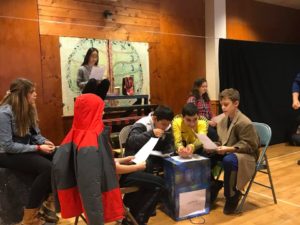 Celebration and Community. The living museum presentation is a centerpiece of community during which students bring in Jewish ritual objects from their homes and explain their history and significance to their families. They also collect tzedakah (charity) throughout the year and decide collectively on how to donate the funds. The class Shabbaton weekend at Camp Harlam is a highlight of the year and begins to build grade-wide community for the children.
Celebration and Community. The living museum presentation is a centerpiece of community during which students bring in Jewish ritual objects from their homes and explain their history and significance to their families. They also collect tzedakah (charity) throughout the year and decide collectively on how to donate the funds. The class Shabbaton weekend at Camp Harlam is a highlight of the year and begins to build grade-wide community for the children.
Grade 7
Robin Cornelison has taught at TBO since 2004. She has worked on all facets of Jewish education and specifically the 6th-grade program at TBO.
“My love for teaching and watching children learn and grow is what keeps me coming back to this wonderful Temple.”
Dr. Ray Zirkel. See “Dr. Z”’s bio in Grade 6.
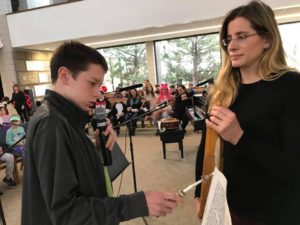
Hebrew and T’filah (Prayer). Since most students become B’nai Mitzvah during 7th grade, the study of Hebrew and Torah shifts from groups to individuals with a tutor. Throughout the year, students receive 15, half-hour, one-on-one coaching sessions to prepare their blessings and Torah and Haftarah readings for their B’nai Mitzvah. They also meet for three sessions with Rabbi and four with Cantor.
Torah, Israel, Culture and Values. The goal for 7th grade is to integrate students seamlessly into the high school program. Weekly dinners, numerous trips, and an informal grade-wide educational setting encourage students to stay connected to Judaism and Jewish life and to continue their Jewish studies.
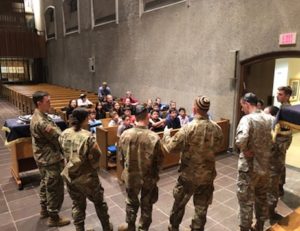 Topics studied include Jewish immigration, Jewish moral-decision making, and why money matters. Students experience first hand how Jews celebrate Shabbat across a spectrum of Jewish practice. We celebrate Shabbat at Central Synagogue (a major Reform congregation in NYC), B’nai Jeshurun (unaffiliated congregation in NYC with their own siddhur), Romemu (Renewal movement in NYC) and the Jewish community at the U.S. Military Academy at West Point (traditional). After services at West Point, students have Shabbat dinner with Jewish Cadets.
Topics studied include Jewish immigration, Jewish moral-decision making, and why money matters. Students experience first hand how Jews celebrate Shabbat across a spectrum of Jewish practice. We celebrate Shabbat at Central Synagogue (a major Reform congregation in NYC), B’nai Jeshurun (unaffiliated congregation in NYC with their own siddhur), Romemu (Renewal movement in NYC) and the Jewish community at the U.S. Military Academy at West Point (traditional). After services at West Point, students have Shabbat dinner with Jewish Cadets.
Grade 7 – Special Programs
Special programs augment topics taught in class. Students participate in the Living Voices Ellis Island story and visit the Tenement Museum on the Lower East Side of Manhattan.
Moving Tradition’s Rosh Hodesh – It’s a Girl Thing is an experiential education program currently touching the lives of 3,500 girls across North America. Mrs. Glyck and Mrs. Lilienfeld lead 7th-grade girls in the Rosh Hodesh program for 10 sessions during the year. The program uses Jewish teachings and practices to give girls a place to feel safe, articulate their deepest concerns, consider the impact of gender on their daily lives, have fun, and be ‘real’ with their peers. Through discussion, arts and crafts, creative rituals, games, and drama, the girls and teachers draw on Jewish values and a gender lens to explore the issues such as body image, friendship, relationships, family, competition, and stress. It is the first program to draw on Jewish teachings to keep girls healthy, instilling in them the ability to counter narrow views of gender in popular culture.
Grade 8
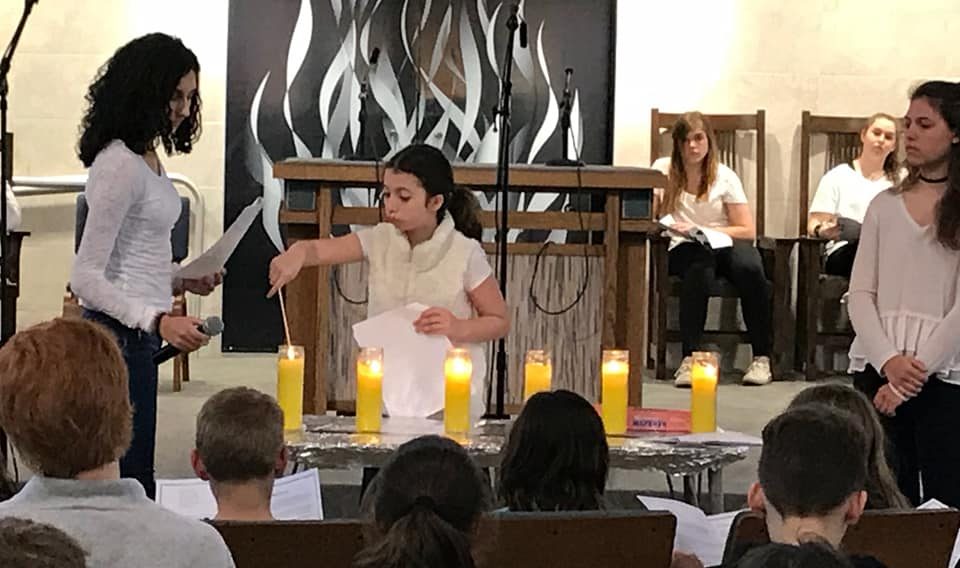
Guy Ratki has taught at TBO since 2015, most recently Grades 3, 4, and 5. In 2018, guy completed his Master’s of Arts in Teaching with a specialization in students with disabilities at Montclair State University.
“I love teaching at TBO because the students are some of the most engaged and interested students that I’ve had the privilege of working with. Each year I’m more excited than the last because of what I learn from each year’s students. The atmosphere is one of kindness and generosity and allows me to reach every student, transcending what Hebrew school has always been.”
Torah, Israel, Culture and Values. Throughout the year, students explore who they are. What identities do they have? How are they part of the Jewish community? This is a great way for self-reflection, especially post-B’nai Mitzvah. Students take time to reflect on their feelings of being Jewish, which allows them to gain insight into themselves.
Students are invited into a larger conversation about how being Jewish impacts them. How do current events and being Jewish affect them? Does it matter? Should it matter? These tie into discussions and activities related to study of the Holocaust.
Throughout the year, students are challenged and asked to commit themselves to introspection, which is facilitated through multiple means such as text, video, song, art, and much more. Community develops that is built on trust, honesty, respect, and inclusion.
Our hope for children, especially in a religious school classroom, is to feel a sense of community that is built on respect for all, regardless of differences in speech, action, and appearance. Free thinking and inclusion are priorities. All children deserve to be heard, and they should feel welcomed and proud to be Jewish.
Grade 9
Cantor Galit Dadoun-Cohen. See Cantor Dadoun-Cohen’s bio in Music.
Torah, Israel, Culture and Values. Our goal is to awaken students’ curiosities for Jewish learning and our ancestors, as they define themselves as individuals, as Jews, and as young American citizens. We look to our history as a source of wisdom to give us perspective and shed light on communal and global challenges and actively apply this learning in a group philanthropy project.
Cantor Dadoun-Cohen leads students in a survey of Jewish History: The BIG Picture, using the book by Gila Gevirtz. This lively and accessible text presents the full range of Jewish history, from biblical to contemporary times and treats students to a fast-paced account of Jewish history, brimming with information on topics as diverse as the development of Christianity beyond its Jewish roots into a new religion and the revival of Hebrew as a spoken language. We learn colorful anecdotal details about Jewish communities throughout history and around the world, such as how Passover was celebrated on the Civil War battlefield and the origins of Beta Israel, the Ethiopian-Jewish community.
Jewish Teen Philanthropy. In this short course on Jewish values and teen philanthropy, students co-create a teen foundation and learn first hand about tzedakah (charity), guided by Mrs. Cornelison and resources from the Jewish Teen Funders Network. While the giving of money may be part of tikkun olam (repair the world) or g’milut hasadim (acts of loving kindness), honoring the obligation to give financial resources in order to create a more just world is at the core of this effort. The group wrestles with whether to give only to Jewish organizations or to allocate more broadly, exploring texts that address how we decide where to give. The goals of the Teen Foundation program are:
- To enable teens to understand and act upon the Jewish values of tzedakah, tikkun olam and g’milut hasadim through the creation of a teen foundation
- To support healthy adolescent development by offering, engaging activities, opportunities for leadership and relationships with trusted adults
- To help teens establish associations with nonprofit organizations in their local community and in Israel
- To nurture a new generation of Jewish philanthropists and activists.
Grade 10 – Confirmation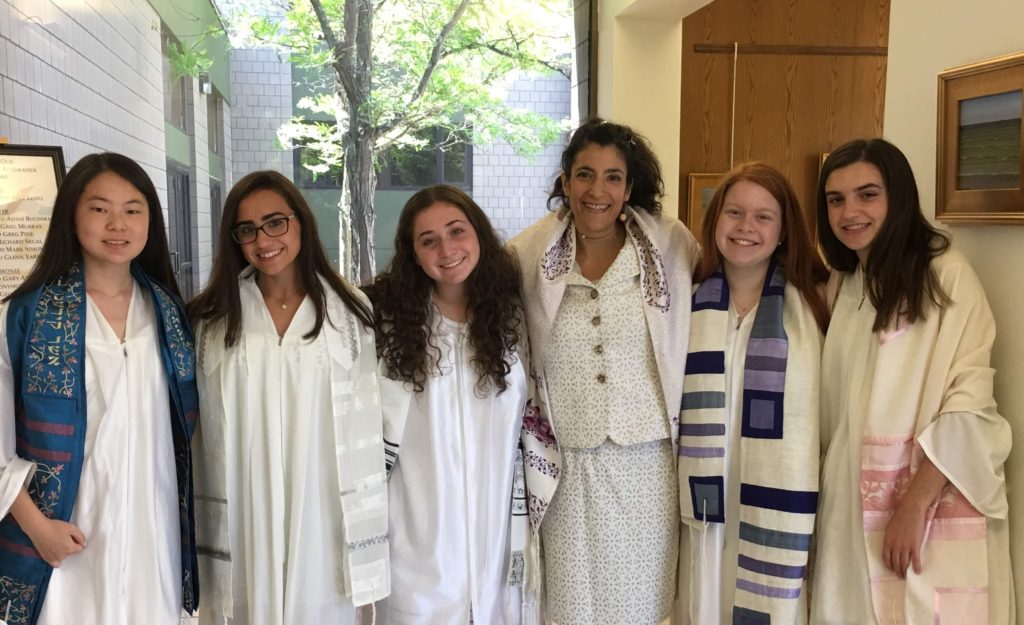
David Iskovitz. See Mr. Iskovitz’s bio in the Introduction.
Rabbi Michael Satz. Rabbi Michael Satz studied Jewish Studies and International Relations at Tulane University where he received his Bachelor of Arts degree. At Hebrew Union College–Jewish Institute of Religion he was granted his Masters of Hebrew Letters. He was ordained in 2007. Rabbi Satz has worked as an Assistant Rabbi at Congregation M’kor Shalom in Cherry Hill, NJ and as an Associate Rabbi at Beth Israel in San Diego, CA and Holy Blossom Temple in Toronto. Rabbi Satz brings a wealth of knowledge and experience in worship, pastoral care, youth and adult education and social action.
“Judaism is a dynamic, evolving and pluralistic tradition. Through texts, music, prayer, celebrations, Israel and relationship people experience Judaism in many different ways. The Rabbi’s job is to help facilitate these experiences for Jews in community with other Jews.”
Torah, Israel, Culture and Values. Our Confirmation students learn about the Jewish views on life after death and the customs and rituals surrounding mourning, which developed directly from the various theologies. The students have the opportunity to choose mini-courses. Topics include Judaism’s views on sex, suicide, and abortion, along with Israel, the Boycott, Divestment and Sanctions (BDS) movement, and the challenges of living a Jewish life in America. Part of the year is devoted to preparing for the Confirmation service.
Celebration and Community. Confirmation is a Reform-originated ceremony for teens and is tied to the holiday of Shavuot. It constitutes an individual and group affirmation of commitment to the Jewish people. The 10th graders lead the Confirmation service on Shavuot and share their thoughts about their evolving journeys into Jewish adulthood.
 In preparation for Confirmation, the class, our Director of Education, clergy, and youth coordinator attend a retreat in Washington D.C. or Philadelphia. In Washington D.C., students attend the four-day Religious Action Center of Reform Judaism’s “L’Taken Social Justice Seminar”. L’Taken is an intensive enrichment program that encourages Jewish high school students to build Jewish community and learn to apply Jewish values to social justice issues. TBO students join almost 500 other L’Taken participants in worship during Kabbalat Shabbat and Shabbat morning services and Havdallah at the Jefferson Memorial. Students visit the United States Holocaust Memorial Museum and the Martin Luther King, Jr. Memorial and spend more than 12 hours learning about numerous social justice issues and practicing advocacy skills.
In preparation for Confirmation, the class, our Director of Education, clergy, and youth coordinator attend a retreat in Washington D.C. or Philadelphia. In Washington D.C., students attend the four-day Religious Action Center of Reform Judaism’s “L’Taken Social Justice Seminar”. L’Taken is an intensive enrichment program that encourages Jewish high school students to build Jewish community and learn to apply Jewish values to social justice issues. TBO students join almost 500 other L’Taken participants in worship during Kabbalat Shabbat and Shabbat morning services and Havdallah at the Jefferson Memorial. Students visit the United States Holocaust Memorial Museum and the Martin Luther King, Jr. Memorial and spend more than 12 hours learning about numerous social justice issues and practicing advocacy skills.
The seminar culminates in students visiting their congresspersons’ offices to advocate on social justice issues. Hear TBO students advocate for social justice issues to their congresspersons in these facebook videos:
- Reproductive Rights: http://bit.ly/tbo_reproductive_rights
- Gun Violence: http://bit.ly/tbo_gun_violence
- Disability Rights: http://bit.ly/tbo_disability_rights
- Immigration Reform: http://bit.ly/tbo_immigration_reform
- Israel: http://bit.ly/tbo_israel
“Attending L’taken was not only a great learning experience but also incredibly empowering. I learned so much about the government but also about my ability to make a change in the world. I believe that attending L’taken is an experience that each and every young individual should have.” – Rachael Goldstein
During the trip to Philadelphia, students deepen their personal relationships with the clergy and each other. This is the first group trip since 6th grade and is forerunner to the communal Confirmation experience. Students report that the Confirmation class trip is when they “bond” as a group. In addition to visiting sites in Philadelphia, students and staff attend Kabbalat Shabbat services at historic Congregation Rodeph Shalom, founded in 1795 as the first Ashkenazic congregation in the Western hemisphere. On Saturday, students have Shabbat morning services with our clergy, tour the National Museum of American Jewish History, and then visit Hillel at Temple University, Drexel University or University of Pennsylvania. For most students, visiting Hillel is their first experience with Jewish life on a college or university campus. Students meet with clergy and students at Hillel and the visit prepares them to ask about Hillel and Jewish life on campus when they visit colleges. The day concludes with Havdalah and dinner.
Grades 11 & 12 – Orim

David Iskovitz. See Mr. Iskovitz’s bio in the Introduction.
Rabbi Michael Satz. See Rabbi Satz’s bio in Grade 10.
Torah, Israel, Culture and Values. Orim (11th and 12th grades) meet bimonthly with Mr. Iskovitz, Rabbi Satz and guests to prepare them for their Jewish journey into adulthood. Our Orim students study the subjects of anti-Semitism in America, the theological roots of Reform Judaism including the period of ancient history when the split between Judaism and Christianity occurred, the challenge of living in an open, free society as dedicated Jews, and the major sociological trends in modern Jewish life. The students are also introduced to the study of Talmud and Midrash.
Celebration and Community. The highlight of the year is the 12th-grade Orim graduation in May. The graduates lead all aspects of the service, share their plans for life after high school, and eloquently describe their journeys into Jewish adulthood.
Many Orim graduates attended our pre-school and, with the love and support of their families and teachers, have spent more than 15 years at Temple B’nai Or growing into young adults who love and celebrate being Jewish Americans.

